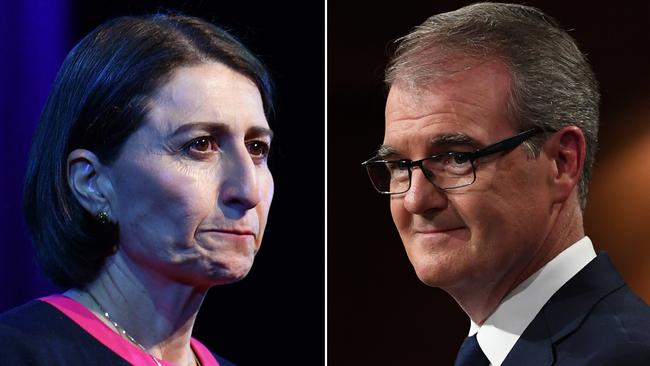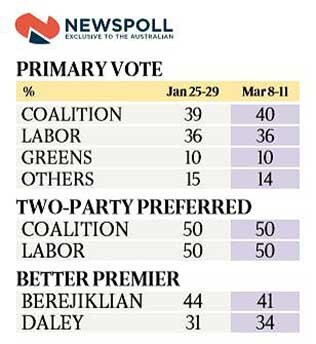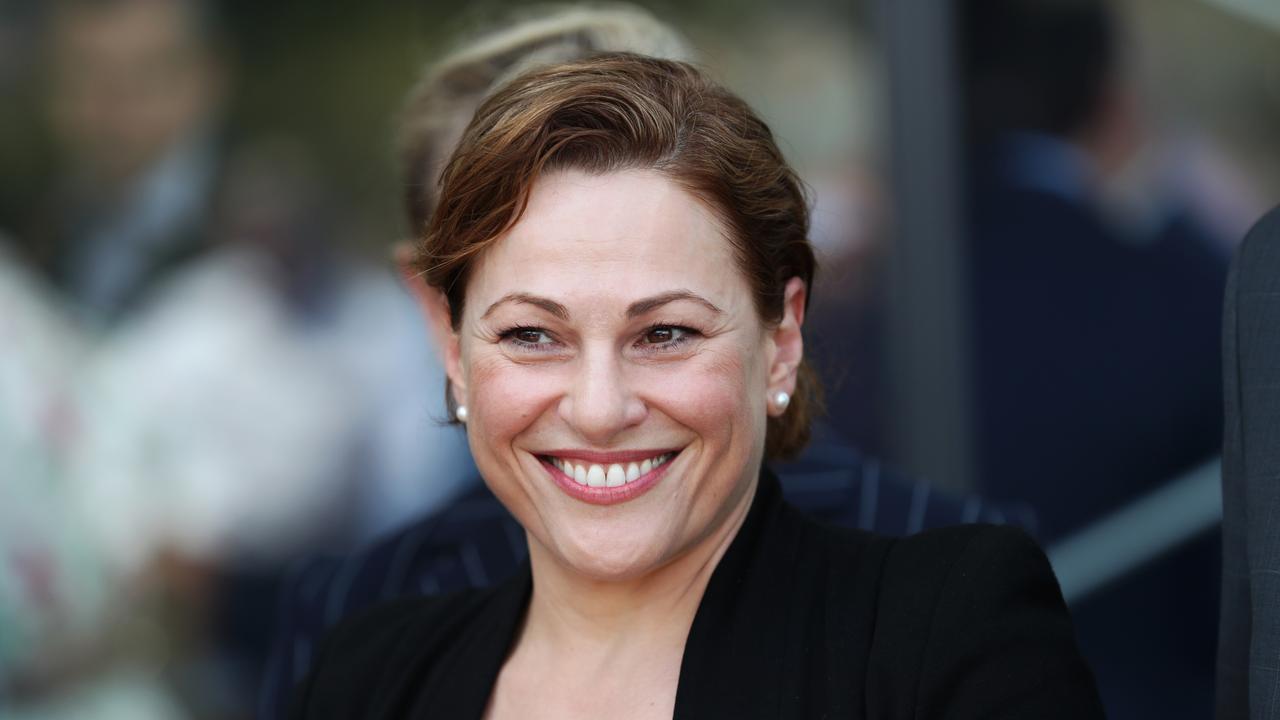NSW state election: deadlock points to minority rule
NSW faces minority government for the first time in 24 years, with the Coalition and ALP deadlocked, an exclusive Newspoll finds.

NSW is on the brink of minority government for the first time in 24 years, with the Coalition and Labor deadlocked less than two weeks out from the March 23 state election.
An exclusive Newspoll conducted for The Australian finds neither Premier Gladys Berejiklian nor Labor’s Michael Daley have been able to gain an election-winning advantage, despite big spending promises from the Liberals, and Labor stoking controversy over the demolition of Allianz Stadium.
The 50-50 two-party-preferred result in the Newspoll, taken from Friday to yesterday, represents a 4.3 per cent swing away from Mike Baird’s 2015 election win and would see six government seats lost if repeated uniformly across the state.

This would wipe out Ms Berejiklian’s majority and leave her reliant on independents to govern.
The result, published as prepolling ahead of the election began yesterday, is identical to the two-party-preferred vote recorded in the previous two NSW Newspolls, on January 25-29, and in February-March 2018, when Luke Foley was Labor leader.
It is one point below the Coalition’s 51-49 result recorded shortly after Ms Berejiklian became Premier in early 2017, reinforcing concerns that she has struggled to gain political traction in two years despite embarking on a massive infrastructure program, delivering budget surpluses and presiding over low unemployment.
In today’s poll, the Coalition’s primary vote edged up one point to 40 per cent — a key number for the government as it presses for a majority under an optional preferential voting system.
Labor’s primary vote was 36 per cent, which represented no change from the last poll, but a two-point increase on last year.
The Greens’ primary vote also remained unchanged, at 10 per cent, while the “others’’ vote was 14 per cent.
Satisfaction ratings increased for both Ms Berejiklian and Mr Daley, as voters began to focus on the election, with Ms Berejiklian’s satisfaction rating rising three points to 44 per cent and dissatisfaction with her performance dropping five points to 38 per cent. Eighteen per cent of voters remained uncommitted.
Mr Daley’s satisfaction rating rose four points to 37 per cent, with dissatisfaction down two points to 38 per cent and 25 per cent uncommitted.
Ms Berejiklian leads on the crucial better premier measure, but it is the tightest lead a premier has had in the eight-year life of the Coalition government. Mr Daley has closed the gap by six points since the last Newspoll.
Ms Berejiklian was considered the better premier by 41 per cent of voters, down three points, to Mr Daley’s 34 per cent, a rise of three points, with 25 per cent undecided.
This represented the closest better premier result since November-December 2010, when then premier Kristina Keneally was at 35 per cent and then opposition leader Barry O’Farrell was at 40 per cent. Three months later, Mr O’Farrell led the Coalition to office in a record landslide.
Ms Berejiklian’s better premier rating is also below Mike Baird’s low of 42 in August-September 2016, shortly after he banned the greyhound racing industry. However, Labor’s then leader, Luke Foley, was preferred by just 24 per cent of voters.
The poll of 1003 voters statewide was taken from Friday to Monday, with both the Liberal and Labor parties launching their campaigns on Sunday.
The poll was taken shortly after Mr Daley created headlines by telling powerful broadcaster Alan Jones live on air that, if elected, he would sack him and his colleagues from the SCG Trust board over the decision to press ahead with the $730 million knockdown and rebuild of Allianz Stadium.
Ms Berejiklian misstepped at a press conference on the stadiums issue last Thursday, then went on the attack, appearing at Western Sydney Stadium on Friday to defend the $2 billion policy.
On Sunday, she used her launch in Penrith to hit back at Labor’s “Schools and hospitals before stadiums” slogan by declaring that “NSW can have it all”.
Yesterday Mr Daley was in the marginal seat of Penrith, held by 6.2 per cent, while Ms Berejiklian visited the marginal seats of East Hills, Penrith and Goulburn (which the Liberals hold by 6.6 per cent).
If the Newspoll swing were uniform across the state, Ms Berejiklian’s government would lose four Nationals seats — Upper Hunter (held by 2.2 per cent), Monaro (held by Deputy Premier John Barilaro by 2.5 per cent), Lismore (held by 2.9 per cent) and Tweed, held by 3.2 per cent.
It would also lose two Liberal seats: Coogee, held by the Liberals by 2.9 per cent, and East Hills, held by 0.4 per cent.
Political operatives believe the government can hold Monaro and even potentially Upper Hunter, as the Shooters, Fishers and Farmers are not preferencing Labor in the seat.
But there are fears of losses in safer seats for the Coalition such as the Nationals seat of Barwon (to the Shooters party), Finance Minister Victor Dominello’s seat of Ryde, Sports Minister Stuart Ayres’s seat of Penrith, and Goulburn and Coffs Harbour.
Concern also extends to safer seats such as Transport Minister Andrew Constance’s seat of Bega.
A Fairfax poll on Sunday had Labor ahead by 51 per cent to 49 per cent statewide and marginal-seat polls in Sydney’s The Daily Telegraph newspaper had the Nationals behind in the marginal seat of Lismore, 51-49, and only just ahead in the far western NSW seat of Barwon, also 51-49, a 12 per cent swing against the government.
Illustrating the closeness of the election, two other marginal-seat polls taken by the Telegraph during the campaign have had the government 50-50 in East Hills and the Coalition ahead just 53-47 in the seat of Ryde, an 8 per cent swing against the government.
All four seats are within the margin of error of 3 per cent for such polls, so the government could lose all those seats or win all of them.
Mr Daley’s launch on Sunday was in the East Hills seat, at the Revesby Workers Club, where he promised $2.7bn for education.
The Coalition is confident that, if it loses just six to eight seats, it could form government with the help of independents Greg Piper, Alex Greenwich and potentially Joe McGirr.
The Coalition holds 52 seats in the current parliament with Labor on 34, the Greens and independents holding three each, and the Shooters, Fishers and Farmers party holding one.




